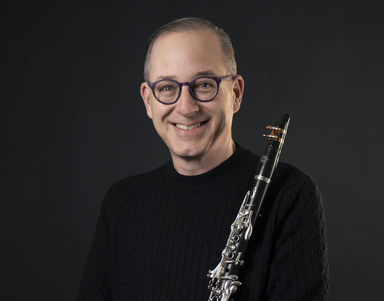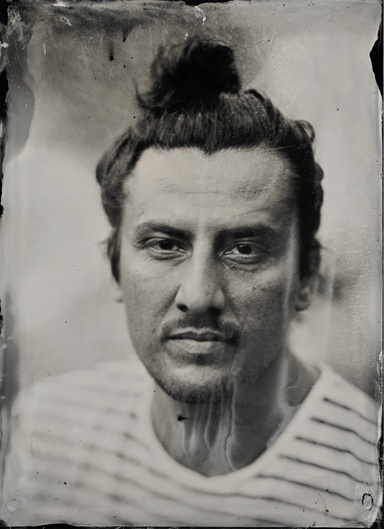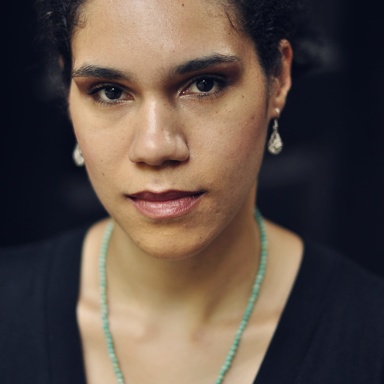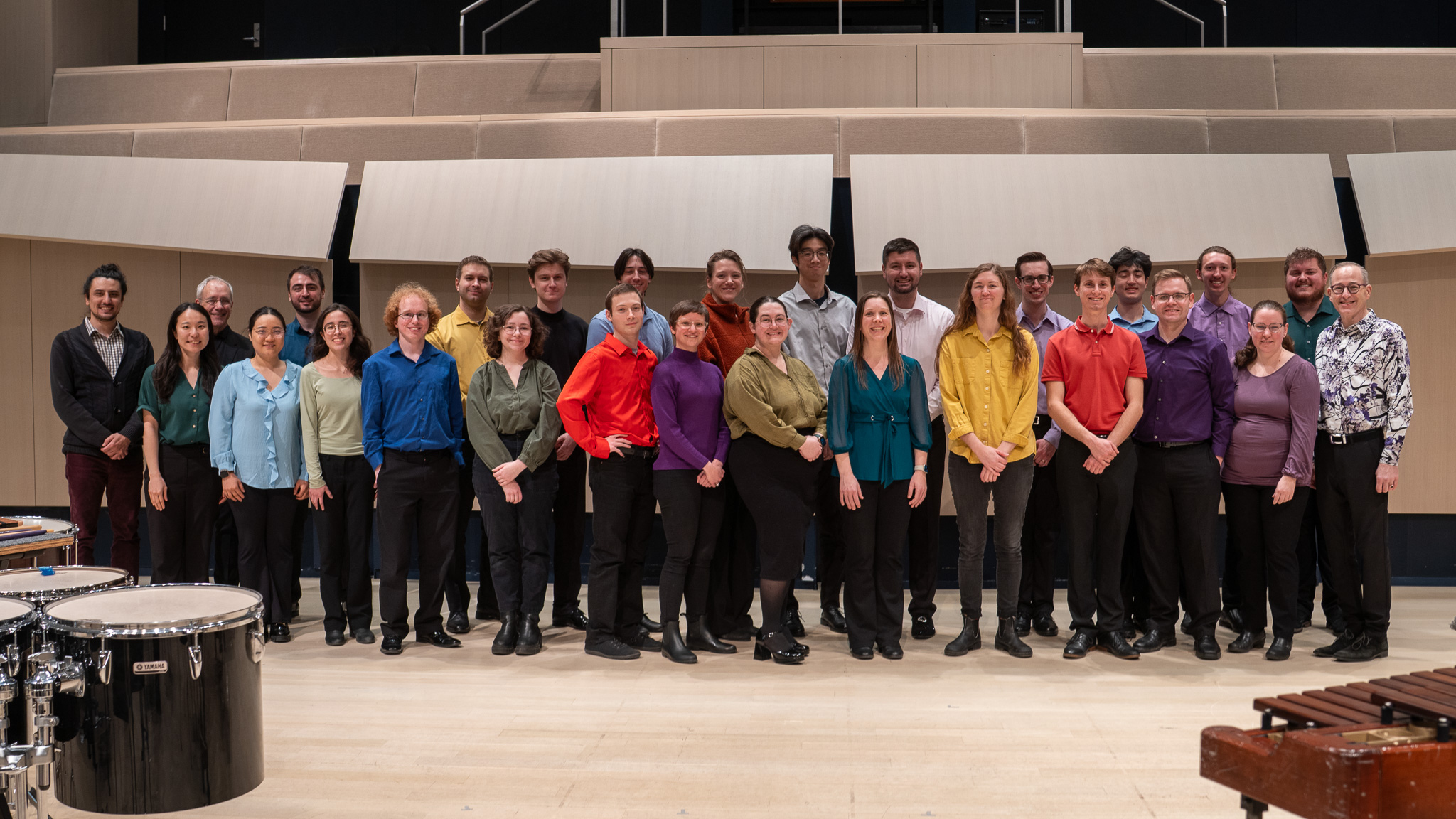CNM Ensemble Concert III
Sunday, March 9, 2025 at 7:30p in the Concert Hall
featuring guest clarinetist
Michael Norsworthy
Program
Shades of Ice, for clarinet, cello and electronics (2012) | Agata ZUBEL (b. 1978) |
| Sayyod Mirzomurodov, clarinet Hanna Rumora, violoncello Jean-François Charles and Sangguen Choi, electronics |
not-being-us (2024) - premiere | Ramin ROSHANDEL (b. 1987) |
Concerto Grosso, for clarinet, piano, violin solo, and string quintet (2024) | Jessie MONTGOMERY (b. 1981) |
intermission
Clarinet Concerto (1996) | Eliott CARTER (1908-2012) |
Performers biography

Grammy award winner, Michael Norsworthy, has been heard in major concert halls around the globe and is a recognized educator, technician and consultant. His personal approach to presenting, developing and nurturing the artistic possibilities around him have resulted in partnerships with world class musical collaborators, schools of music and manufacturers. As soloist with numerous orchestras around the USA and abroad, as a captivating recitalist and chamber music performer and as one of the most celebrated champions of the modern repertoire having premiered over 150 new works at such venues as Carnegie Hall, Vienna’s Musikverein, Moscow’s Tchaikovsky Hall, The Casals Festival and the Aspen Festival, Norsworthy has defied categorization, dazzling critics and audiences alike. His discography, numbering over 80 releases, can he heard on Naxos, Mode, Gasparo, Albany, New Focus, New World, BMOP/sound, ECM, Navona, Nonesuch, Canteloupe and Cauchemar records. He is the owner of New York City Woodwinds and is a proud performing artist for Selmer Paris and Vandoren. |
Center for New Music Musicians
| Roshandel - not-being-us Emily Ho, flute Felisha Jones, oboe Sayyod Mirzomurodov, clarinet Erik J Lopez Reyes, bassoon Erica Ohmann, horn Jake Fekete, trumpet Xiaoyu Liu, trombone Matt Sleep, tuba Neil Krzeski, electric piano McKenna Blenk, percussion Yestyn Griffith and Michael Klyce, violins Rebecca Vieker, viola Hanna Rumora, violoncello Xiaowen Tang, double bass David Gompper, conductor |
| Montgomery - Concerto Grosso Sayyod Mirzomurodov, clarinet Neil Krzeski, piano Yestyn Griffith violin solo Rachel Peters, violin I Renee Santos, violin II Oliver Bostian, viola Hanna Rumora, violoncello Xiaowen Tang, double bass David Gompper, conductor |
| Carter - Clarinet Concerto Michael Norsworthy, clarinet Joshua Stine, flute David Cyzak*, oboe Felisha Jones, oboe/EH Keegan Hockett, bassoon Erica Ohmann, horn Jake Fekete, trumpet Xiaoyu Liu, trombone Matt Sleep, tuba Miles Bolhman, percussion I Evan Tanner, percussion II Will Walters, percussion III Erin Freund, harp Neil Krzeski, piano Yestyn Griffith, violin I Michael Klyce, violin II Rebecca Vieker, viola Hanna Rumora, violoncello Xiaowen Tang, double bass David Gompper, conductor •=SOM faculty |
Program Notes

Agata ZUBEL (b. 1978) Agata Zubel, composer and vocalist. Known for her unique vocal range and the use of techniques that challenge stereotypes. |

Ramin ROSHANDEL (b. 1987) In one of my composition lessons with Nader Mashayekhi once, he said [and I rephrase what I recall]: “We, Iranians, have emotional attachments to these intervals” and what he was referring to, was Persian music intervals. After thinking for a long time about what he reminded me of, during that lesson, accepting it, and finally acknowledging it, I realized that not only is it intuitive for me to utilize Persian music intervals in their pure sense, but it is also necessary. This was specifically important because I deliberately questioned using such material in my compositions and even subconsciously ignored it for quite some time. That realization is intuitive because it is a significant part of my identity as a result of the soundscape I grew up in. It is also necessary because that is how I believe I can and want to express myself through music. Doing otherwise simply just feels 'not right'. Writing Persian music intervals for Western classical instruments is not something that has not been done before. The first generations of Iranian (and non-Iranian) composers did it a long time ago (c.19th century). Also, as soon as Western instruments made their way to Iran, Persian musicians adapted them in a way that would allow them to play what they wanted–which was the musical pitches that sounded correct to them. Nevertheless, some compositions were written using equal temperament. To me, that always sounded compromised on one hand and de-tuned on the other. That is what I intentionally avoid in my compositional practice. It is also what justifies the role of the piano being re-tuned in this piece as well as the intervals that have been written for orchestra. Since the Woman-Life-Freedom movement started in Iran in 2022, I think my life has been split into two time periods: before the political events and their related impacts, and after them. I have also been thinking about the meaning of us, Iranians as a highly diverse nation comprised of multiple ethnic groups, languages, and cultures, yet spread out all across the globe because of the imposed political situation on our homeland over the past five decades. This piece is an attempt to reflect on all of this. During the process of composing this piece, I came across a description for a photograph in which there was a quote from a poem by John Ashbery: Out of our hands, to install it on some monstrous, near The title of this composition is not meant to create a direct relationship between the poem and the meaning it conveys. However, this short phrase profoundly resonated with me in my own thoughts and made me use it as the title of my piece. Ramin Roshandel is a composer and setar player. His compositions have been performed by Benjamin Coelho, Anna Elder, Nicole Esposito, Will Fried, Daniel Schreiner, The JACK Quartet, Ensemble Dal Niente, Kamratōn Ensemble, and LIGAMENT duo, as well as in festivals such as Society for Electro-Acoustic Music in the United States (SEAMUS), NYC Electroacoustic Improvisation Summit, MOXSonic, TurnUp Multimedia Festival, the Society of Composers’ Summer Student Mixtape. Roshandel was the setar soloist in Jean-François Charles’ opera, Grant Wood in Paris in its premiere. He was awarded The University of Iowa Digital Scholarship and Publishing Studio summer scholarship and is a Summer Institute for Contemporary Music Practice (SICPP) and New Music On the Point alumnus. |

Jessie MONTGOMERY (b. 1981) |

Eliott CARTER (1908-2012) |
